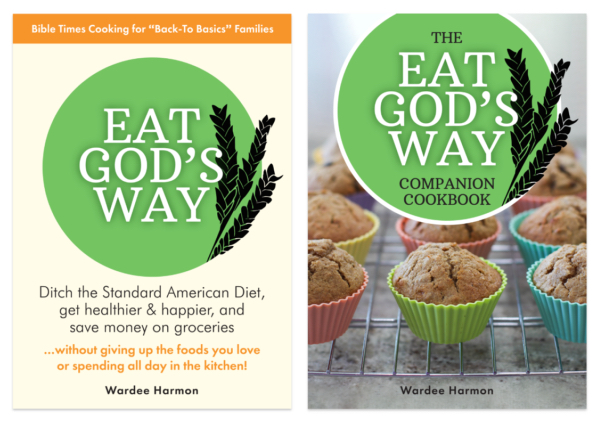
In this episode of Know Your Food with Wardee, I’m taking listener questions, including:
- whether veggies continue to ferment in fridge
- whether it is possible to get botulism from ferments?
- ratio of salt in ferments
- if you can ferment Challah dough
- what’s recommended for a Candida yeast infection
- choosing between raw, local and organic, store-bought milk (the answer may surprise you)
- whether lacto-fermentation causes dental caries (due to lactic acid eroding enamel)
- what to do about possible allergic reaction to cheese
- the difference between my Lacto-Fermentation eBook and The Complete Idiot’s Guide to Fermenting Foods
Plus I shared what’s going on at our place (getting the garden ready)!
Podcast: Play in new window | Download
Subscribe: RSS
Won’t play for you? Try here.
Mobile or desktop users, you can hear my podcast with Stitcher, on-demand and on-the-go. (What’s Stitcher?) You can also get it on iTunes or subscribe in the Podcasts app.
Listener Questions
Here are the questions I answered in this episode, in the order they’re answered (in case you want to skip around). The podcast contains my answers, plus if I mentioned any additional resources, they are linked here along with the question.
Podcast: Play in new window | Download
Subscribe: RSS
Nancy asked (via voicemail): Fermenting veggies, and put in the fridge. After a week, do they ferment more? I’m noticing that they seem more fizzy. Normal, healthy to eat? Possible to get botulism?
Rebecca asked (via email): I took your fundamentals course the first time it was offered and I had a question about fermenting the ginger carrots. I wanted to know if you could do it without whey and if so how much salt is required. I tried 1 1/2T but it didn’t seem to ferment and tasted way too salty. Do you need a certain amount of salt to ensure a ferment and if so how much would that be? Any help is appreciated! It was also good to meet you when you visited Phoenix recently!
Batyah asked (via email): Shalom. I am wanting to know how to long to long ferment whole grain sourdough and ferment whole grain challah. I bring the Challah to Shabbat lunches and am wanting something healthier. If I put the dough I fridge for 1-4 days will that ferment the Challah? I know some put it in fridge for next day baking for ease but wondering if that ferments the dough also. I was just going to put my regular whole wheat sourdough with honey in fridge. For regular while grain sourdough can I just mix up a regular whole grain recipe and keep in fridge? Really having trouble finding long ferment whole grain sourdough. Will putting it in fridge for 24 hours ferment it? Do I need a special recipe? My community says my white flour Challah is the best they have had but we all are getting fatter and a lot of us have digestion issues etc. so wanting to thin us all out. I do realize regular whole grain sourdough Challah will be better than the other but really would like the entire dough made healthier (by souring). Thanks for any help you can give me.
Batyah, I asked on Facebook or links to sourdough Challah, but nothing came up that was sourdough (here’s a whole wheat challah that’s not soured). Check it out, though, because Tanner gave a tip for creating your own:
“Challah is defined by its quantity of eggs, I see no reason why you could use, one to two cups of low hydration starter, and at least 6 eggs, I think typical recipe uses 8, where the last two yolks are used for brushing the weave before baking.”
Then I asked Google, and here’s a set of recipes you can try (though you may have to sub whole wheat flour):
- Sourdough Challah — Sourdough Home
- Sourdough Challah — The Fresh Loaf
- Sourdough Challah — The Challah Blog
- Sourdough Challah — The Gingered Whisk
Karla asked (via email): I was wondering what you would suggest for a Candida yeast infection?
- GAPS diet
- GAPS diet series here at this blog
- Body Ecology Diet
Susan asked (via email): I live in Tempe, AZ and I met you at church with Sonya on Palm Sunday! Here’s my question: If you had to choose between buying local, raw, jersey cow milk where the cow was eating non-organic and perhaps GMO feed and not on pasture VS organic, pasteurized, homogenized store bought milk which would you choose? The raw milk is only $5 a gal. and the store bought milk is a little over $6. The store bought milk is Organic Valley and the company says the milk comes from a CA farm where the cows graze.
My answer is in the episode. I’m curious whether anyone who have a different answer? Be sure to share in the comments!
Here’s the Genetic Roulette movie.
Mare asked (via email): Does lacto fermentation cause dental caries because lactic acid erodes enamel?
- Ramiel Nagel’s site: Cure Tooth Decay
- Ramiel Nagel’s book: Cure Tooth Decay
- Nutrition and Physical Degeneration by Weston A. Price
Joseph asked (via email): Hi, we’ve exchanged a few emails before about sourdough. Which I love, grew up on it living in the San Francisco Bay Area, and now have my own starter I cultivated here in Montana. Still going strong, and have given some to friends, which I think you’ve seen from Facebook. I have a question, and wondering if you can help. I think I might be allergic to dairy. I’ve had rashes on my arms for over a year now, and thought it was gluten, but after having cheese I got really itchy. I’m a vegetarian, so cheese was a big part of my diet. Just seeing if you might have any recommendations to help, or any advice. I’ve gone about a week without dairy, for the most part (I’ve had a few instances of having something I didn’t know dairy was in), but my rash seems like it’s clearing up. I’m a little lost with what to do. One of my favorite snacks was cheese and crackers, or a nice bowl of homemade mac and cheese for dinner.
- GAPS diet
- GAPS diet series here at this blog
- Body Ecology Diet
Also coming up in June, the Heal Your Gut online class reopens.
Natasha asked (via email): I recently received “The Art of Fermentation” for my birthday, but I was turned off by the fact there were not definite recipes to follow. I noticed on Amazon that you have The Complete Idiot’s Guide to Fermentation, but then I saw on your site that you also have the Lacto-Fermentation eBook. Which one should I purchase? We don’t want foods that are so funky no one will want to try them. I need things the kids will gladly try. We’ve had kombucha, yogurt, kefir, and other simple foods like that the children have enjoyed. They didn’t really enjoy beet kvass, fermented carrots, and a few of the other things I have tried from Nourishing Traditions. I don’t want to give up on fermentation though. I think we just need to try some kid-tested recipes.
Natasha, I forgot to answer on the podcast about the kid-friendly aspect. I can’t guarantee that your children will love everything in either book, but as a general rule, my recipes are kid-friendly. My family enjoys most of the ferments.
What’s Coming Up!
Next week I’m taking more listener questions!
iTunes
I’d be grateful if you’d visit my podcast on iTunes and leave a rating and/or review. KnowYourFoodPodcast.com/iTunes or traditionalcookingschool.com/iTunes This helps me make my podcast better and also helps others find it. Thank you!
For past or current episodes, check out the Know Your Food with Wardee podcast archives.
Anything to Add?
I would love to hear from you! What advice would you add to any of my answers? Do you have a good sourdough whole grain challah recipe? What milk would you choose if you were in Susan’s shoes? Please share what your answers would be to any of these questions.
Like this podcast? Please help me reach others by using the share buttons at the top of this post. Thanks!
...without giving up the foods you love or spending all day in the kitchen!

2 free books:
Eat God's Way
Ditch the Standard American Diet, get healthier & happier, and save money on groceries...
We only recommend products and services we wholeheartedly endorse. This post may contain special links through which we earn a small commission if you make a purchase (though your price is the same).


I just wanted to chime in regarding the challah. Our searches for a healthier challah led us to simply making ours with sprouted flour and lots of egg yolks for the lecithin. Everything else was simply TOO SOUR for challah. While the loaves still *looked* pretty like challah, the taste was not what we wanted for a celebratory, Shabbat bread.
We use the recipe from The Challah Blog (that you linked above) for Sprouted Challah, only I use 4 yolks in the bread and save the whites for the wash after rising. We also add a teaspoon of tumeric to give it a yummy yellow color, with no taste.
Hope that helps!
Julie — Yes, that helps very much! Thank you! 🙂
I have started looking into making things with raw milk and was wondering what I have when raw milk sours after a few weeks in the refrigerator and then we set it outside to give to the pigs and it seperates into a clear liquid and thick white chunks that you can pick up and they will not break. We tried making sour cream with a 1/2 gallon left out on the counter for 3 days but only a small thin layer formed. It was not enough to skim. Maybe our cow is not giving enough cream??
Ben — That’s clabber cheese, a normal thing that happens as milk sours. First it gets thick and sour and then it separates in to curds and whey.
If you’re only getting a thin later of cream, then yes, that would mean your cow isn’t giving that creamy of milk. Are you sharing milk with a calf? Often the cow will hold back milk for her calf and that’s the creamiest milk, at the end. This is the reason we weaned our calf — we were hardly getting any milk and barely any cream because our cow was holding so much back for her calf.